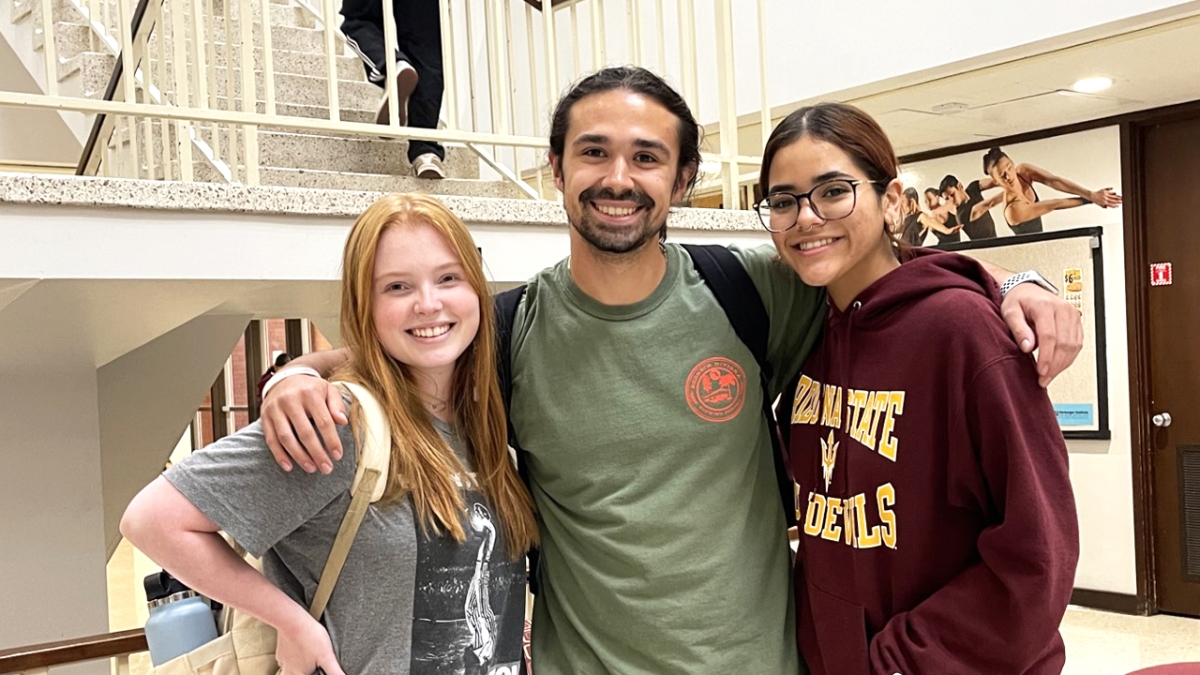3 Interplanetary Initiative students awarded ASU/NASA Space Grant internships

From left: Lindsey Tober, Matthew Marquez and Elizabeth Garayzar. Courtesy photo
Three outstanding Arizona State University students with a passion for advancing our understanding of space will soon have the opportunity to extend their academic pursuits beyond the classroom by conducting cutting-edge research and contributing to groundbreaking initiatives that hold the promise of shaping our future in space.
Lindsey Tober, Elizabeth Garayzar and Matthew Marquez have each been selected as recipients of prestigious internship grants from the ASU/NASA Space Grant office, a member of the Arizona Space Grant Consortium.
NASA Space Grant is a nationwide program funded by NASA and designed to develop the young minds of STEM graduate and undergraduate students into thinking beyond the classroom by actively performing NASA-related research alongside a faculty mentor.
"These three students are richly deserving of such recognition, and they are understandably excited for the opportunity that comes with such a grant to conduct their own research. Lindsey, Elizabeth and Matthew will each have the chance to develop ideas that will ultimately realize real-world applications,” said Eric Stribling, a faculty member in the Interplanetary Initiative who will serve as a mentor to both Tober and Garayzar.
Lance Gharavi, a professor in the ASU School of Music, Dance, and Theatre and associate director of the Interplanetary Initiative, will provide mentorship to Marquez.
The ASU/NASA Space Grant office is led by Thomas Sharp, professor in the School of Earth and Space Exploration. The ASU program is designed to support educational, research and public engagement projects that contribute to the advancement of the nation's science enterprise. Additionally, it plays a pivotal role in promoting greater diversity and representation in science, technology, engineering, and mathematics (STEM) fields.
"ASU/NASA Space Grant has been a wonderful partner in helping us involve more undergraduate students in Interplanetary’s research into how space technologies might impact a more inclusive and sustainable future for our global community," Stribling said. "This is really a next-level opportunity for the students to make an impact by using the many innovative lessons learned in our degree program. Also, it’s a unique chance to enhance their skills in practical and interdisciplinary research in a hands-on, problem-solving environment."
Hailing from diverse backgrounds, each of the selected students is pursuing a degree in the Interplanetary Initiative’s technological leadership program, a unique degree that prepares students to answer tomorrow’s questions in the fields of science and technology.
Tober, a junior in the program, is working on a project called "Space for Humans," which aims to foster insightful discussions about the evolving space industry through weekly short-format videos showcasing key findings and developments from ASU Interplanetary Initiative research.
Tober expressed her gratitude for the unique opportunities that her technological leadership degree has provided.
"I’ve really struggled finding my own path around space, because I have so many different interests," she said. "This degree program has given me the confidence to pursue a career in space technologies and film, which no other degree offers."
Garayzar, also a junior, is working on the SpaceHACK project. This unique hackathon project focuses on leveraging satellite data to address pressing real-world issues spanning social, economic and environmental dimensions on Earth.
Garayzar expressed her enthusiasm for the interdisciplinary nature of the Interplanetary Initiative and the tech leadership program.
"The Interplanetary Initiative provides a dynamic and interdisciplinary environment that isn't usually found in a lot of space or engineering organizations," she said. "Tech leadership ensures that its students are being taught to think outside the box when it comes to the design of space technologies. And we're highly encouraged to think about how these technologies can also be used to benefit Earth and its inhabitants."
Garayzar’s project merges her passion for space and her desire to make a positive impact on people's lives. By utilizing space technologies and satellite data, she aims to map and monitor natural disasters in communities facing challenges. These maps can identify high-risk areas and enable the creation of early warning systems, ensuring the safety of residents.
Marquez, a senior in the program, is embarking on a self-directed research project titled "Exploration Of ChatGPT as a Research Tool for Exoplanet Detection and Analysis." This project harnesses the power of widely available AI tools, including ChatGPT, to inform research on identifying new extrasolar planets orbiting stars outside our solar system.
"Tech leadership and Interplanetary at ASU is a crucible for interdisciplinary research, seamlessly blending engineering, data science and even astrobiology," he said. "As a student, I've been able to work on real-world projects that challenge the status quo. This interdepartmental synergy is crucial for addressing the multifaceted challenges of space exploration and planetary sustainability."
Beyond advancing the field of AI in astrophysics, Marquez's project seeks to democratize access to complex data analytics.
“The excitement in this project stems from its interdisciplinary nature," Marquez said. "By tailoring ChatGPT to act as a research tool for nonexperts, we're not only advancing the field, but also empowering individuals to contribute to the larger scientific narrative."
More Science and technology

ASU-led space telescope is ready to fly
The Star Planet Activity Research CubeSat, or SPARCS, a small space telescope that will monitor the flares and sunspot activity…

ASU at the heart of the state's revitalized microelectronics industry
A stronger local economy, more reliable technology, and a future where our computers and devices do the impossible: that’s the…

Breakthrough copper alloy achieves unprecedented high-temperature performance
A team of researchers from Arizona State University, the U.S. Army Research Laboratory, Lehigh University and Louisiana State…

